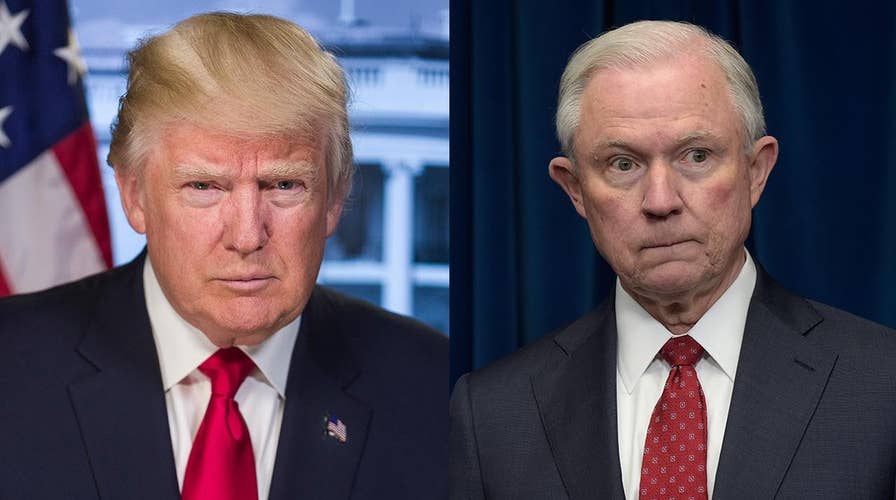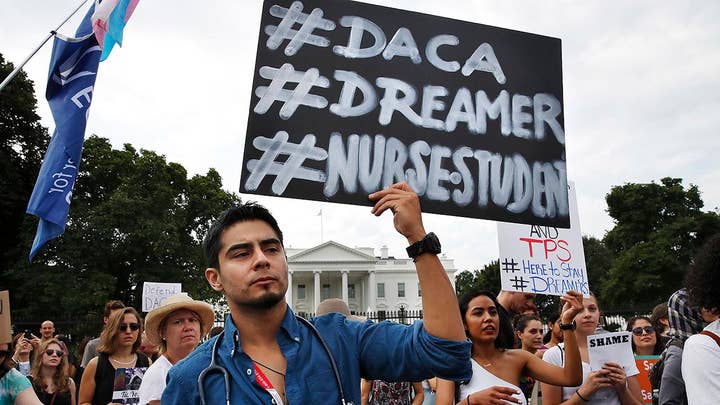Trump’s feuds with Jeff Sessions: A history
A look at the fracturing relationship between Attorney General Jeff Sessions and President Donald Trump
Attorney General Jeff Sessions on Monday lit into federal judges for what he called a dramatic uptick in "outrageous" decisions threatening to interfere with the separation of powers by exposing internal White House deliberations.
In a fiery speech to the conservative Heritage Foundation in Washington, Sessions warned that "once we go down this road in American government, there is no turning back." He vowed to take "these discovery fights to the Supreme Court in emergency postures. ... We intend to fight this, and we intend to win."
Sessions specifically singled out New York district court judge Jesse M. Furman, who ruled that Commerce Secretary Wilbur Ross could be questioned in an ongoing lawsuit concerning the legality of the Trump administration's decision to add a citizenship question to the 2020 census.
Furman's decision, Sessions said, contradicts longstanding statutory provisions that protect certain executive branch discussions from disclosure, in order to encourage free and open deliberations by executive branch officials. The plaintiffs in the lawsuit, including several liberal states, are arguing in part that the White House added the citizenship question for political reasons.
The judge wants "to hold a trial over the inner workings of a Cabinet secretary’s mind," and inappropriately allow inquiry into the motivations for the Trump administration's decisions, Sessions said.
Furman's order, which was upheld by a New York federal appellate court, has been stayed by Supreme Court Justice Ruth Bader Ginsburg. The full Supreme Court is expected to decide the issue soon.
"Once we go down this road in American government, there is no turning back."
The pending court challenges against the Trump administration's decision to add a citizenship question, legal experts tell Fox News, face an uphill battle not only because conservatives now command a 5-4 majority on the Supreme Court, but also because traditionally it's been the White House's prerogative to decide whether to inquire about citizenship on the census.
Former President Barack Obama's administration didn't ask the question in the 2010 census amid fears it would unconstitutionally intimidate illegal immigrants into avoiding answering their census questions -- and thus not count toward population totals used to determine the number of seats each state receives in the House of Representatives. (The citizenship question was last asked on the census in 1950, but beginning in 1970, a citizenship question was asked in a long-form questionnaire sent to a relatively small number of households, alongside the main census. In 2010, there was no long-form questionnaire.)
Democrats would lose out because the citizenship question would affect predominately liberal districts, but that's not a legally sufficient objection, legal analysts say.
TRUMP CENSUS BUREAU NOMINEE QUIZZED BY SENATORS ON CITIZENSHIP QUESTION
"There is no credible argument to be made that asking about citizenship subverts the Constitution and federal law," Chapman University law professor and constitutional law expert John Eastman told Fox News. "The recent move is simply to restore what had long been the case."
Eastman also told Fox News it would be legally permissible for the government to only count citizens for purposes of determining representation in the House of Representatives. However, other legal experts have contested that view, saying the Constitution demands that all "persons" be tallied -- not all citizens.
Nevertheless, Sessions said Monday, liberal states and nonprofits have continued to push even longshot legal challenges in order to dig around in executive branch deliberations.
"This is not the first time we’ve had to seek emergency appellate intervention to stop outrageous discovery," Sessions said. Last year, the government filed a successful emergency motion to stop a district court's ruling that permitted plaintiffs to question a Department of Homeland Security counselor about advice relating to the contentious Deferred Action for Childhood Arrivals (DACA) program.
Sessions called that lower court ruling a "blatant violation of deliberative process and attorney-client privileges" and warned that it would have a "chilling effect" on deliberations in the White House.
He added, "Too many judges believe it is their right, their duty, to act upon their sympathies and policy preferences."
The attorney general blamed Obama for encouraging that approach. "One argument for activism was advocated openly by President Obama when he declared his judicial nominees must judge with 'empathy.' It is a seductive argument. But whatever empathy is, it’s more akin to emotion, bias, and politics than law," Sessions said.
"In the recent DACA litigation, for example, a judge last year told one of our DOJ litigators, 'You can’t come into court to espouse a position that is heartless,'" Sessions continued. "Not illegal. Not unlawful. Heartless. And later, after I responded in a speech that it isn’t a judge’s job to decide whether a policy is 'heartless,' the judge again scolded the DOJ lawyer by stating that I 'seem to think the courts cannot have an opinion.'"

Judge Nicholas Garaufis denied the government's motion to dismiss a DACA lawsuit, citing President Trump's "bigoted" comments. (Reuters, FIle)
That judge, U.S. District Judge Nicholas Garaufis, was appointed to the bench by former President Bill Clinton. He ruled in March that a lawsuit seeking to preserve the federal DACA program can continue -- citing candidate Donald Trump's "racial slurs" and "epithets."
“One might reasonably infer,” Garaufis said in his politically charged ruling, “that a candidate who makes overtly bigoted statements on the campaign trail might be more likely to engage in similarly bigoted action in office.”
Separately, Sessions also said the 27 nationwide federal injunctions issued by individual judges during the Trump administration so far -- which brought temporary halts to high-profile policies like his ban on travel from Muslim-majority nations -- constitute an unprecedented "judicial encroachment."
"It is emphatically not the duty of the courts to manage the government or to pass judgment on every policy action the Executive branch takes," Sessions said. "In the first 175 years of this Republic, not a single judge issued one of these orders."
In his confirmation hearings for the Supreme Court in September, then-nominee Brett Kavanaugh was asked by Louisiana Republican Sen. John Kennedy about the constitutionality of individual federal judges issuing nationwide injunctions against presidential action, a recent phenomenon. Kavanaugh demurred, saying he could not discuss potential pending issues before the Supreme Court.
Sessions noted that Associate Justice Clarence Thomas, who concurred in the high court's decision earlier this year to reinstate Trump's travel ban, wrote that such injunctions “take a toll on the federal court system—preventing legal questions from percolating through the federal courts, encouraging forum shopping, and making every case a national emergency for the courts and for the executive branch.”
He added: "Executive branch officers do not work for the judiciary. We work for the president of the United States. Respect runs both ways."






